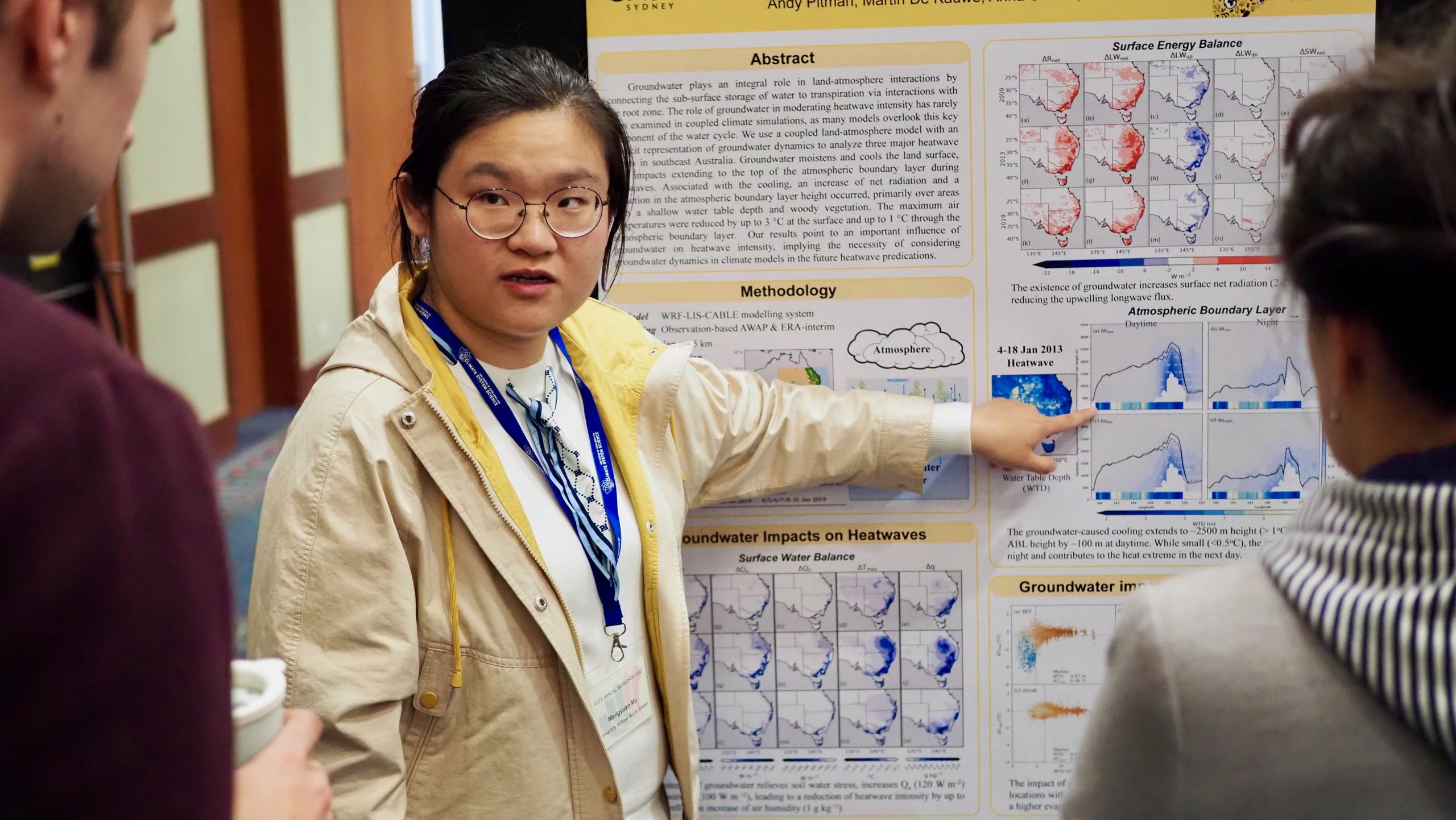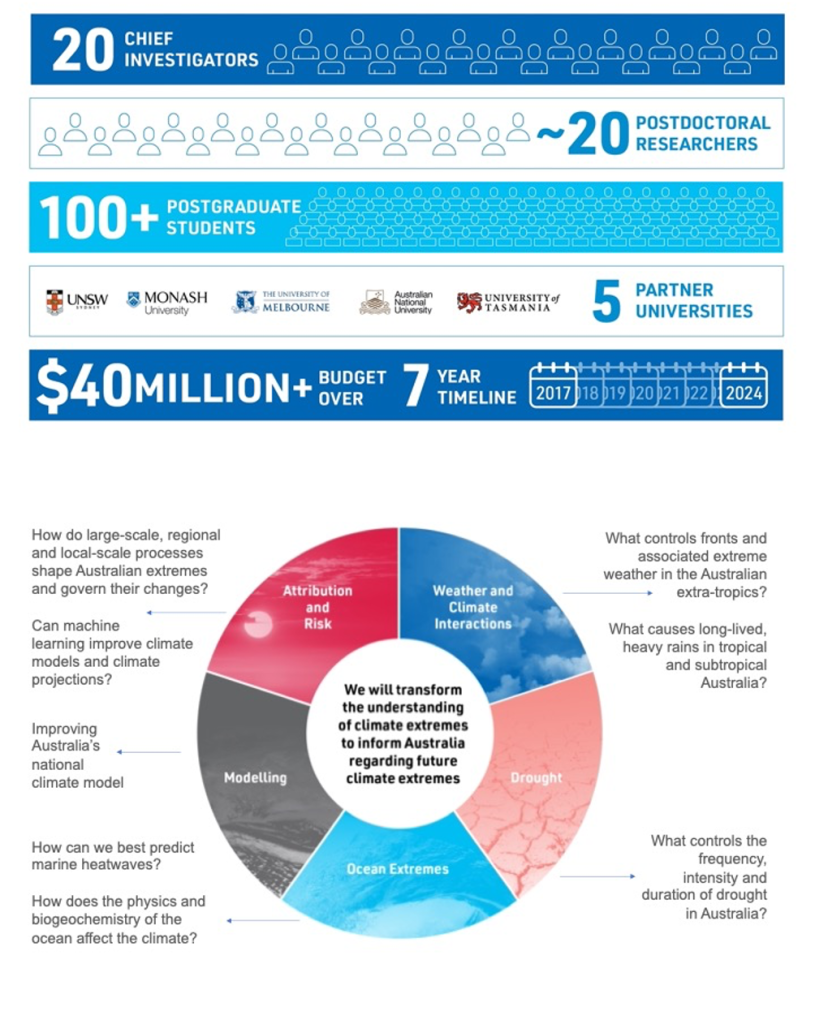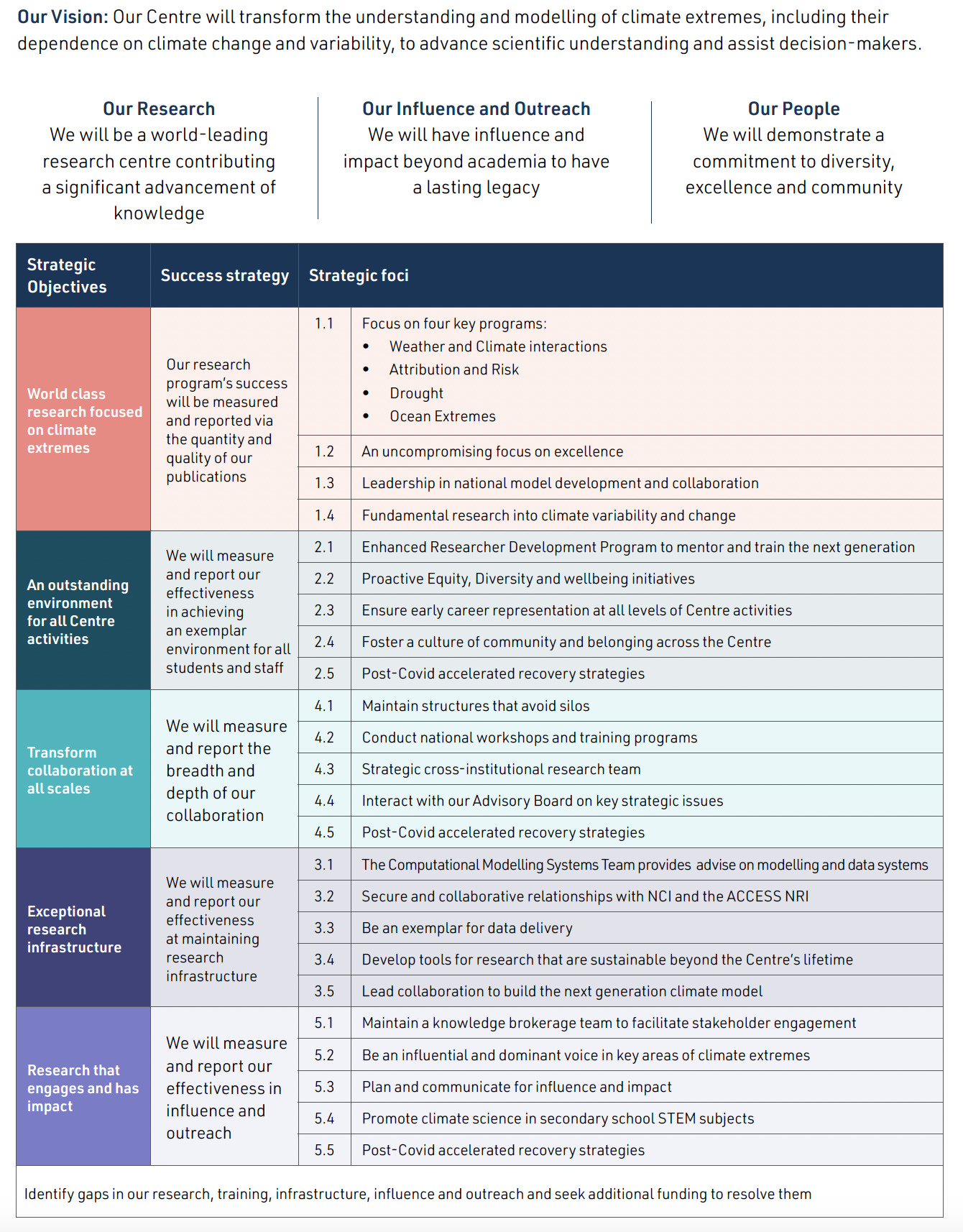Your first task:
Please fill out our Affiliation Form on our website here.
This ensures we have your up to date biography, photo and details for our website and databases.
Next task:
If you plan to do media, add your name to the SciMex database.
If you’re already listed on their database, please update your profile with your affiliation to the Centre.
Welcome from the Centre Director
Welcome to the ARC Centre of Excellence for Climate Extremes.
ARC Centres of Excellence are Australia’s premier research centres. We are expected to transform the scale and impact of research. We are also agents of change in terms of how research is done, how it is reported, how we engage with business and government, how we challenge biases in the system, how we help and support work-life balance and so on.
As part of the ARC Centre of Excellence for Climate Extremes you are part of a large consortium. You are appointed to a position or enrolled at one University, but you are strongly encouraged to access expertise across all member Universities, our multiple groups within Australia and our international affiliates. You are part of a team reflecting the world’s best researchers in our field; this is only important to you if you utilise the opportunities this provides.
So, take advantage of being part of the Centre. Visit other Universities and other research organisations. Find others working on similar problems and talk to them, collaborate with them. Use our Researcher Development Program, seek expert guidance from our Computational Modelling team, tap into the expertise of our Knowledge Brokerage and Media and Communications teams. The Centre is here to help you, enable you, stretch you and support you. If you are struggling, we can help. If you are excelling, we can celebrate with you.

As Director, I try to know what is going on. With a group of around 100 connected people I may sometimes miss an emerging problem, or something that should be celebrated. Please tell me if something is upsetting you, or annoying you, or where you see something that could be done better. We can fix many things, but only if we know about them.
Finally, please read the other documents in this package. They are designed to communicate both the opportunities and resources open to you, and the expectations we have of you.
So, welcome, and if you have any questions, just ask!
Yours truly,
Andy Pitman
Director, ARC Centre of Excellence for Climate Extremes

The Centre at a Glance

5 research programs
- Attribution and Risk
- Weather and Climate Interactions
- Drought
- Ocean Extremes
- Modelling
5 Universities
- UNSW
- Australian National University
- Monash University
- University of Melbourne
- University of Tasmania
6 Australian Partner Organisations
- Bureau of Meteorology
- CSIRO
- NCI
- NSW Department of Planning, Industry and Environment
- Risk Frontiers
- Sydney Water
7 International partner organisations
- CNRS – IPSL (France)
- ETH Zurich (Switzerland)
- Max Planck Institute for Meteorology (Germany)
- NASA GSFC (USA)
- NCAR – (USA)
- NOAA – GFDL (USA)
- UK Met Office (UK)
- University of Arizona (USA)
Computational Modelling Support
- Dedicated six-person team to enable your work
Researcher Development Program
- Bespoke scientific and professional development
Greetings

Vilia Co – Chief Operations Officer
As the Centre’s Chief Operations Officer my role is to ensure the Centre has the structures and processes in place to support your research. It’s also my job to remove impediments that might get in the way of working across institutions. The centre also has an admin team that is distributed across all five nodes. Get to know the Centre EA at your node (see below) as they will be incredibly helpful to you over your time with us. We are a centre that cultivates a culture of diversity, respect, professionalism, cooperation, collaboration and inclusion. These tenets are core to our values as an organisation and we look forward to your engagement in all aspects of Centre life. We are a publicly funded organisation with responsibility to report on our activities back to government. That forms a large part of my responsibilities and is a challenge in a geographically distributed Centre, which is why we have tools in place to try and make that data capture process as easy on you as possible so that your focus can stay primarily on your research. I look forward to meeting you at Centre-wide events such as our annual workshop. In the meantime, don’t hesitate to get in touch. v.co@unsw.edu.au

A/Prof Melissa Hart – Researcher Development Director
I lead our Researcher Development Program. This is an overarching program of training, professional development, and mentoring that involves all Centre researchers. Nested within our Researcher Development Program, is our Graduate Program, which provides a tailored curriculum to develop the intellectual and technical capacity of our students. I coordinate training and development opportunities like our Winter Schools, writing workshops and professional development seminars, and work with our CMS team to organise technical training. I also coordinate our undergraduate summer program, and mentoring program. In short, my role is to ensure our researchers are equipped with the capacity required to take on the research challenges of the future. I also act as an advocate for our students and ECRs to ensure you all get the most from your time with us. Although physically based at UNSW, I travel around the nodes frequently, and you will see me at Centre events. I am available at any time via phone or email, so please feel free to get in touch if you have any questions about opportunities available, or simply want to chat. melissa.hart@unsw.edu.au

Paola Petrelli – Computational Modelling Support Team Leader
The Computational Modelling System team is here to help you with all your computational and data needs from large (e.g. modifying and running large climate models) to small (e.g. help with your analysis script). We also provide in-person and online training to the Centre’s staff. The team is distributed across the five nodes of the Centre. We encourage you to get in contact with your local CMS team member early on as we are a great source of knowledge on the computational and data infrastructures as well as modelling systems available to you. We also maintain a wiki http://climate-cms.unsw.wikispaces.net/ with detailed, up-to-date information about the datasets and models we support. Finally, the simplest way to reach any of us is to email our help desk at cws_help@nci.org.au
Node Admin Contacts
Finance: Susana Widjaja (s.widjaja@unsw.edu.au)
UNSW: Jenny Rislund (j.rislund@unsw.edu.au)
UNSW: Taira Malby-Freckleton (t.malby-freckleton@unsw.edu.au)
ANU: Mary Hapel (climateadmin.rses@anu.edu.au)
UniMelb: Simon Parsons (simon.parsons1@unimelb.edu.au)
Monash: Silvana Katragadda (silvana.katragadda@monash.edu)
UTAS: Sushila Desai (sushila.desai@utas.edu.au)

Victoria Ticha – Media and Communications Officer
I look after media and communications at the ARC Centre of Excellence for Climate Extremes. I am passionate about disseminating high-quality climate research to the broader public, translating complex ideas into engaging narratives that advocate for action on climate change, inform policy, and promote sustainable business practices. I am here to support and guide our climate researchers, empowering them to effectively communicate the impact of their work to a wider audience. Feel free to reach out to me anytime for assistance with writing, media pitching, or simply to connect.
v.ticha@unsw.edu.au

Angela Kaplish – Knowledge Brokerage Team Lead
The Centre’s Knowledge Brokerage Team works to increase the impact of the Centre by engaging with government agencies and private companies to understand their requirements for information about climate extremes. The team is working closely with Centre researchers to ensure that relevant research and data are communicated to these stakeholders. a.kaplish@unsw.edu.au
CMS Team Members
UNSW: Ramzi Kutteh (r.kutteh@unsw.edu.au)
UNSW: Samuel Green (sam.green@unsw.edu.au)
ANU: Aidan Heerdegen (aidan.heerdegen@anu.edu.au)
UniMelb: Dale Roberts (dsroberts@unimelb.edu.au)
Monash: Holger Wolff (holger.wolff@monash.edu)
UTAS: Paola Petrelli (paola.petrelli@utas.edu.au)
Committees
ECR Committee
The Early Career Researcher (ECR) committee brings together one student and one postdoc from each node of the Centre (i.e., UNSW, ANU, Monash, Unimelb, UTAS). Committee members meet via video conference every two months and a representative from the committee attends Centre executive meetings. The ECR committee provides a platform for cross-institutional, non-research related discussions between the ECRs and between those ECRs and the executive committee of the Centre. These may include matters relating to career development, social events, working arrangements, funding and extracurricular activities. The ECR committee provides a formal communication channel between ECRs and the executive committee. Thus, the ECR committee takes any concerns, suggestions or feedback to the executive committee, and vice versa, on a regular basis. The ECR committee provides its members a chance to represent their fellow ECRs on any issues that arise, ensuring that their time at the Centre is as pleasant and productive as possible. It also provides its members leadership experience and insight into how the Centre operates and into the issues involved in managing a research centre.
Infrastructure Committee
The Infrastructure Committee exists to provide monitoring, guidance and advice to the Centre Executive on matters such as climate models and modelling systems, issues relating to data, issues surrounding the Centre’s relationship with the National Computational Infrastructure (NCI) such as resource allocation. The Committee also serves as a conduit for communication between the Centre’s researchers and the Computational Modelling Support team.
Diversity and Culture Committee
The Diversity and Culture committee is responsible for developing and implementing a range of initiatives in the Centre to ensure equity across the spectrums of gender, ethnic and cultural background, sexual orientation and physical ability. The committee is also responsible for providing sound advice and developing initiatives on issues such as mental health, work-life balance and the centre’s culture. The committee also developed the Centre’s Equity Plan please take a moment to download and read it.
Impact and Engagement Committee
The Impact and Engagement Committee provides advice to the Centre on the development and execution of its outreach and communications strategies; highlights opportunities for engagement with external groups and works with the Centre’s Knowledge Brokerage Team to deliver a strong outreach program.
Seminar Committee
The Seminar Committee is focused on inviting speakers from the Centre’s partner organisations, business and government to a Centre-wide seminar series.
Things to Talk to Your Supervisors About
- What research program does my project sit within?
- Who should I be collaborating with at my node, other universities and within our partner organisations and other stakeholders?
- What’s coming up on the Centre’s calendar of workshops and professional development opportunities?
- Why am I always being reminded to report on my activities such as publications, travel, talks, workshops etc and how should I report?
- How do I request funds to travel and support my research?
- How do I get assistance with my computational needs?
- What are my data management obligations?
- Are there committees I can join or other ways I can contribute to the collegiate life of the Centre?
- How do I get added to the website and centre databases & email lists?
- How do I access assistance if I am going through a rough patch, either personally, professionally or academically?
- What affiliations and acknowledgements should I list on papers & data? Why should I set up an ORCID profile?
Personal Training Needs Analysis
A cornerstone of the Centre is to offer extensive professional and scientific support to our ECRs and students: not only to successfully complete their studies or work, but also to prepare for the next stages of their careers. To this end, we have compiled a Personal Training Needs Analysis form. The form recognises that climate science researchers come from a variety of undergraduate backgrounds and start at CLEX with a varying range of skills and knowledge. It reveals the skills and knowledge individuals may need to develop or acquire for successful completion of their project and to prepare for their next career step. We encourage all CLEX ECRs to complete the form, and then revisit it at least once a year. In consultation with supervisors, a Personalised Training Plan can then be completed.
Early career researchers (honours, MSc, PhD, postdocs):
- Complete the Personal Training Needs Analysis form (5-10 mins).
- If there are any areas in which your skill level is low, but priority is high, please discuss them with your supervisor(s).
- Complete the Personalised Training Plan to develop a pathway to success.
- Feedback any major training needs that we can help to support.
Supervisors (CLEX CIs, AIs, or anyone supervising students):
- Encourage your existing, and invite any new, ECRs to complete the Personal Training Needs Analysis form.
- Meet with them to discuss the results.
- Help to support their Training Plan, and regularly discuss progress (we suggest during annual reviews).
- Feedback any major training needs that we can help to support.
Strategic plan

Reporting
Everyone connected to the Centre (chief investigators, post-doctoral researchers, students, associate investigators, etc.) are asked to keep us informed of any of the following Centre-funded or Centre-badged activities:
- New staff or student recruitment (CIs’ responsibility to report on new recruits)
- Invited/hosted visitors to a Centre institution
- Centre funded travel
- Conferences attended and details of papers/posters given
- Seminars given
- Workshops, summer schools and other training and development activities attended or organised
- Engagement and outreach such as public talks and government briefings
- Prizes and awards
- Quotes and appearances in the media
- Publications
To facilitate the reporting process a bespoke online database called Cle(v)er was developed. Users navigate to the portal and provide relevant information for each of the above categories.
To access the online reporting tool, click here.
Postdoctoral research associates are also asked to provide a monthly activity summary to the Centre Director on a separate template. This is so that we can observe progress and identify synergies within ongoing research projects and also so that any blockages or impediments to your work can be identified and rectified early.
Ethical Conduct of Research
The Centre is committed to uncompromising standards of professional conduct and rigour in our research activities. As a student or employee of one of our five universities, you are subject to institutional policies that guide ethical and responsible conduct of research. The links below will take you to institutional landing pages from which further information can be found.
Each of these institutional frameworks are based on the Australian Code for the Responsible Conduct of Research which covers topics including:
- authorship and dissemination of research
- peer review
- data management
- conflicts of interest
- supervision
As a federally funded research centre, it is essential that our individual and collective efforts are fully aligned with the Australian Code. If you have any questions or concerns at any time, please speak to the Centre COO, the Director or with an appropriate senior member of staff at your institution.
Key Centre Policies
The Centre has a number of policy and procedure documents that guide the interactions and engagement of staff and students affiliated with the Centre. Not all of these will necessarily be relevant to you. However, linked in this welcome pack you will find three policies that you should read as they are relevant to everyone in the Centre:
- CLEX Email Protocols
- Diversity, Inclusion and Harassment
- Publications
- A guide to accessing Centre funds
The first spells out the centre’s commitment to address inequality and discrimination as well as our expectations around respectful interactions. We are committed to creating a safe and respectful workplace. This policy should be read alongside your own institution’s code of conduct and equity policies.
The publications policy outlines how you should acknowledge the Centre of Excellence as an author, how you should report your publications to us and the steps you should take if your work is likely to be worthy of media attention.
The third item is a high-level summary of what the Centre is and isn’t able to resource and how to go about requesting support for activities directly related to your research.
If you ever have a query about a centre policy or procedure, have a chat with the admin person at your node or get in touch with the Centre Chief Operations Officer at UNSW.
You can also download PDF copies of Centre policy documents from the Cle(v)er reporting database.
